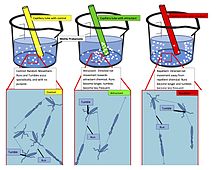
Back انجذاب كيميائي Arabic Hemotaksija BS Quimiotaxi Catalan Chemotaxe Czech Kemotaksi Danish Chemotaxis German Χημειοτακτισμός Greek Kemitaksiso Esperanto Quimiotaxis Spanish Kimiotaxi Basque

Chemotaxis (from chemo- + taxis) is the movement of an organism or entity in response to a chemical stimulus.[1] Somatic cells, bacteria, and other single-cell or multicellular organisms direct their movements according to certain chemicals in their environment. This is important for bacteria to find food (e.g., glucose) by swimming toward the highest concentration of food molecules, or to flee from poisons (e.g., phenol). In multicellular organisms, chemotaxis is critical to early development (e.g., movement of sperm towards the egg during fertilization) and development (e.g., migration of neurons or lymphocytes) as well as in normal function and health (e.g., migration of leukocytes during injury or infection).[2] In addition, it has been recognized that mechanisms that allow chemotaxis in animals can be subverted during cancer metastasis.[3] The aberrant chemotaxis of leukocytes and lymphocytes also contribute to inflammatory diseases such as atherosclerosis, asthma, and arthritis.[4][5][6][7] Sub-cellular components, such as the polarity patch generated by mating yeast, may also display chemotactic behavior.[8]
Positive chemotaxis occurs if the movement is toward a higher concentration of the chemical in question; negative chemotaxis if the movement is in the opposite direction. Chemically prompted kinesis (randomly directed or nondirectional) can be called chemokinesis.
- ^ Chisholm, Hugh, ed. (1911). . Encyclopædia Britannica. Vol. 6 (11th ed.). Cambridge University Press. p. 77.
- ^ de Oliveira S, Rosowski EE, Huttenlocher A (May 2016). "Neutrophil migration in infection and wound repair: going forward in reverse". Nature Reviews. Immunology. 16 (6): 378–91. doi:10.1038/nri.2016.49. PMC 5367630. PMID 27231052.
- ^ Stuelten CH, Parent CA, Montell DJ (May 2018). "Cell motility in cancer invasion and metastasis: insights from simple model organisms". Nature Reviews. Cancer. 18 (5): 296–312. doi:10.1038/nrc.2018.15. PMC 6790333. PMID 29546880.
- ^ Li J, Ley K (January 2015). "Lymphocyte migration into atherosclerotic plaque". Arteriosclerosis, Thrombosis, and Vascular Biology. 35 (1): 40–9. doi:10.1161/ATVBAHA.114.303227. PMC 4429868. PMID 25301842.
- ^ Gelfand EW (October 2017). "Importance of the leukotriene B4-BLT1 and LTB4-BLT2 pathways in asthma". Seminars in Immunology. 33: 44–51. doi:10.1016/j.smim.2017.08.005. PMC 5679233. PMID 29042028.
- ^ Planagumà A, Domènech T, Pont M, Calama E, García-González V, López R, Aulí M, López M, Fonquerna S, Ramos I, de Alba J, Nueda A, Prats N, Segarra V, Miralpeix M, Lehner MD (October 2015). "Combined anti CXC receptors 1 and 2 therapy is a promising anti-inflammatory treatment for respiratory diseases by reducing neutrophil migration and activation". Pulmonary Pharmacology & Therapeutics. 34: 37–45. doi:10.1016/j.pupt.2015.08.002. PMID 26271598.
- ^ Rana AK, Li Y, Dang Q, Yang F (December 2018). "Monocytes in rheumatoid arthritis: Circulating precursors of macrophages and osteoclasts and, their heterogeneity and plasticity role in RA pathogenesis". International Immunopharmacology. 65: 348–359. doi:10.1016/j.intimp.2018.10.016. PMID 30366278. S2CID 53116963.
- ^ Ghose, Debraj; Jacobs, Katherine; Ramirez, Samuel; Elston, Timothy; Lew, Daniel (1 June 2021). "Chemotactic movement of a polarity site enables yeast cells to find their mates". Proceedings of the National Academy of Sciences. 118 (22): e2025445118. Bibcode:2021PNAS..11825445G. doi:10.1073/pnas.2025445118. ISSN 0027-8424. PMC 8179161. PMID 34050026.
© MMXXIII Rich X Search. We shall prevail. All rights reserved. Rich X Search